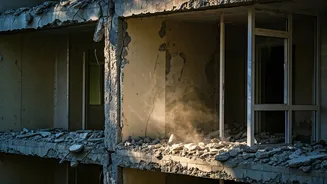Initial Preparedness Steps
In the chaotic moments following a blast, the first moments are critical for survival. One of the most important things to do is to remain calm, as much
as possible. It is also important to familiarize yourself with the immediate surroundings. Be alert of emergency exits and safe zones in public spaces and workplaces. Keep essential items like a first-aid kit and a flashlight easily accessible. Preparing yourself mentally and physically to respond can significantly increase your chances of survival. Knowing how to react can save lives.
Reacting to the Blast
During a bomb blast, the immediate response is extremely important. The most crucial action is to take immediate shelter. If you are indoors, quickly move away from windows and anything that can shatter. Drop to the ground and cover your head and neck with your arms or anything available, such as a sturdy piece of furniture. If you are outdoors, seek immediate cover behind a solid structure, like a wall or a parked vehicle, to shield yourself from flying debris. Remember, staying low is important to minimize the impact of the blast wave and any potential shrapnel. These quick actions can be the difference between life and death.
Protection of Airways
The aftermath of an explosion often includes harmful particles and dust in the air. This makes protecting your airways a priority. If possible, cover your nose and mouth with a cloth, a shirt, or anything that will filter the air you breathe. Doing so reduces the risk of inhaling dangerous debris. If you have access to a respirator, use it immediately. Keeping your airways clear will help you to prevent potential respiratory issues and ensure your body functions properly. Be careful about smoke inhalation as well, it can create long term problems, hence avoid it.
Remaining Vigilant
Following an initial explosion, the possibility of secondary blasts or other dangers remains. Staying alert and aware of your surroundings is of great importance. Be aware of suspicious objects or activities. Do not touch or approach anything that appears out of place or potentially dangerous. Always pay attention to official instructions from emergency services and avoid areas that are cordoned off for investigation or cleanup. Stay away from damaged buildings or other structures, they can pose a threat of collapse, and thus causing further harm. Maintaining a high level of vigilance is crucial for your ongoing safety.
Immediate First Aid
After a blast, assessing and assisting those around you is important. If you are trained in first aid, help others who are injured to the best of your ability. Keep calm and try to assist individuals with serious injuries by controlling any bleeding. Support them by comforting and reassuring them and letting them know that help is on the way. If you are unsure of how to help, wait for professional help, as it is very important not to worsen someone's injuries. Call for medical support immediately. Prompt medical intervention can dramatically increase the chance of survival and recovery.















